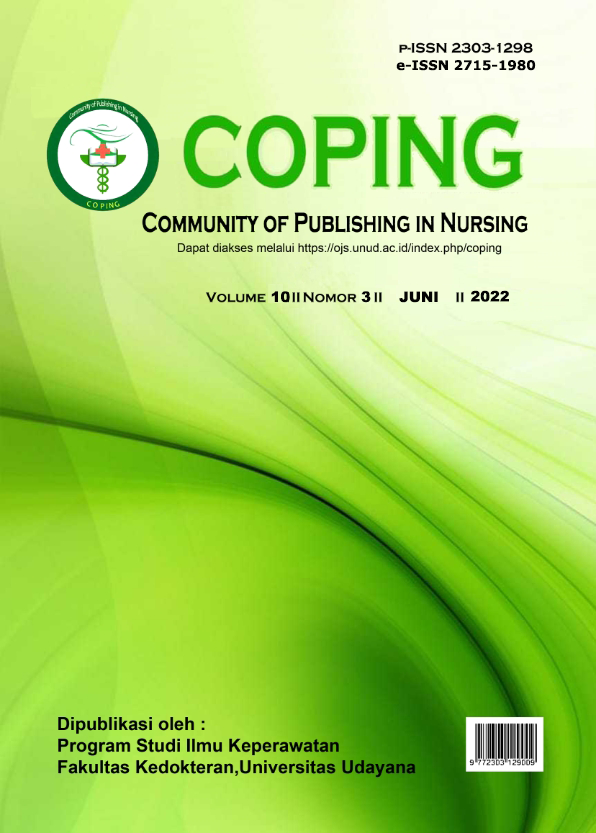STUDI RESILIENSI PERILAKU KEPATUHAN MASYARAKAT POST VAKSIN COVID-19 TERHADAP PROTOKOL KESEHATAN: PATH ANALYSIS
Abstract
Program vaksinasi nasional hingga saat ini telah mencapai 60,31% untuk dosis pertama dan 18,85% untuk dosis kedua. Namun keefektifan vaksin terhadap varian baru virus COVID-19 masih memerlukan adanya penelitian lebih lanjut. Untuk mencegah lonjakan kasus penularan, tindakan protokol pencegahan COVID-19 di masyarakat perlu tetap dilaksanakan. Penelitian ini bertujuan untuk mengetahui faktor-faktor kepatuhan masyarakat untuk menjalankan protokol pencegahan COVID-19 setelah pemberian vaksinasi. Metode penelitian ini adalah observasional dengan pendekatan cross sectional. Pengambilan sampel dilakukan di wilayah Malang Raya. 275 responden berpartisipasi pada penelitian ini. Analisa menggunakan path analysis untuk menguji faktor personal, interpersonal, dan efikasi diri terhadap protokol pencegahan COVID-19. Mayoritas responden (72,2%) dilaporkan memiliki kepatuhan terhadap protokol pencegahan COVID-19 meskipun telah mendapatkan vaksinasi. Faktor personal, faktor interpersonal, dan efikasi diri menunjukkan pengaruh signifikan pada kepatuhan protokol. Sedangkan faktor personal menunjukkan pengaruh yang tidak signifikan pada hubungan tidak langsung terhadap protokol pencegahan COVID-19. Berdasarkan hasil path analysis diketahui bahwa faktor personal, interpersonal, dan efikasi diri merupakan faktor determinan dalam perilaku protokol pencegahan COVID-19 setelah diberikan vaksinasi.
Downloads
References
Asmundson, G., & Taylor, S. (2020). Coronaphobia Fear adn the 2019-nCov outbreak. Journal of Anxiey Disorders, 70(January), 3
Center for Disease Control and Prevention. (2021). Guidance for Full Vaccinated People. https://www.cdc.gov/coronavirus/2019-ncov/vaccines/fully-vaccinated-guidance.html
Hameleers, M., Meer, T. G. L. A. va. deer, & Brosius, A. (2020). Feeling “ disinformed ” lowers compli ance with COVID-19 guidelines : Evidence from the US , UK , Netherlands and Research questions. The Harvard Kennedy School, 1(COVID-19 and Misinformatin)
Han, Y., Jiang, B., & Guo, R. (2021). Factors affecting public adoption of COVID-19 prevention and treatment information during an infodemic: Cross-sectional survey study. Journal of Medical Internet Research, 23(3). https://doi.org/10.2196/23097
Kementerian Kesehatan Republik Indonesia. (2021). Vaksinasi COVID-19 Nasional. https://vaksin.kemkes.go.id/#/vaccines
Lunn, P. D., Timmons, S., Belton, C. A., Barjakova, M., Julienne, H., & Lavin, C. (2020). Motivating social distancing during the COVID-19 pandemi: An online experiment. Social Science & Medicine, 265. https://doi.org/https://doi.org/10.1016/j.socseimed.2020.113478
Mohamed, N. A., Solehan, H. M., Mohd Rani, M. D., Ithnin, M., & Isahak, C. I. C. (2021). Knowledge, acceptance and perception on COVID-19 vaccine among Malaysians: A web-based survey. PLoS ONE, 16(8 August), 1–17. https://doi.org/10.1371/journal.pone.0256110
Pender, N. J., Murdaugh, C. L., & Parson, M. A. (2016). Health Promotion in Nursing Practice (E. Sullivan (ed.); seventh ed)
Prasetyo, Y. T., Castillo, A. M., Salonga, L. J., Sia, J. A., & Seneta, J. A. (2020). Factors Affecting Perceived Effectiveness of COVID-19 Prevention Measures among Filipino during Enhanced Community Quarantine in Luzon, Philippines: Integrating Protection Motivation Theory and Extended Theory of Planned Behavior. International Journal of Infectious Diseases, 99, 312–323. https://doi.org/10.1016/j.ijid.2020.07.074
Ritchie, H., Mathieu, E., Rodés-Guirao, L., Appel, C., Ritchie, C., Edouard Mathieu, L., Rodés-Guirao, C., Appel, Giattino, C., Ortiz-Ospina, E., Hasell, J., Macdonald, B., & Max, D. B. and. (n.d.). Statistiv and Research Coronavirus (COVID-19) Vaccinations. https://ourworldindata.org/covid-vaccinations
Scrima, F., Miceli, S., Caci, B., & Cardaci, M. (2021). The relationship between fer of COVID-19 and intention to get vaccinated. The serial meditaion roles of exsistential anxiety and conspiracy beliefs. Personality and Individual Differences, 184. https://doi.org/https://doi.org/10/1016/j.paid.2021.111188
Singanayagam, A., Hakki, S., Dunning, J., Madon, K. J., Crone, M. A., Koycheva, A., Derqui-Fernandez, N., Barnett, J. L., Whitfield, M. G., Varro, R., Charlett, A., Kundu, R., Fenn, J., Cutajar, J., Quinn, V., Conibear, E., Barclay, W., Freemont, P. S., Taylor, G. P., … Lackenby, A. (2021). Community transmission and viral load kinetics of the SARS-CoV-2 delta (B.1.617.2) variant in vaccinated and unvaccinated individuals in the UK: a prospective, longitudinal, cohort study. The Lancet Infectious Diseases, 3099(21). https://doi.org/10.1016/S1473-3099(21)00648-4
Tanner, K. (2018). Survey Design. In K. Williamson & G. Johanson (Eds.), Research Methods: Information, Systems, and Contexts: Second Edition (Second, pp. 159–192). Elsevier Ltd. https://doi.org/10.1016/B978-0-08-102220-7.00006-6
Tran, V., & Ravaud, P. (2020). COVID-19-related perceptions, context and attitudes of adults with chronic conditions : Results from a cross-sectional survey nested in the ComPaRe e-cohort. PLOS ONE, 15(8), 1–13. https://doi.org/10.1371/journal.pone.0237296
WHO. (2021). COVID-19 weekly epidemiological update. World Health Organization, 58, 1–23. https://www.who.int/publications/m/item/covid-19-weekly-epidemiological-update
World Health Organization. (2021a). COVID-19 advice for the public: Getting vaccine. https://www.who.int/emergencies/diseases/novel-coronavirus-2019/covid-19-vaccines/advice
World Health Organization. (2021b). Vaccine efficacy, effectiveness and protection. https://www.who.int/news-room/feature-stories/detail/vaccine-efficacy-effectiveness-and-protection
World Health Organization. (2021c). WHO Coronavirus (COVID-19) Dashboard. covid19.who.int
World Health Organization. (2020). COVID-19 advice for the public: Getting vaccine. https://www.who.int/emergencies/diseases/novel-coronavirus-2019/covid-19-vaccines/advice
Wright, L., Steptoe, A., Mak, H. W., & Fancourt, D. (2021). Do people reduce compliance with COVID-19 guidelines following vaccination? A longitudinal analysis of matched UK adults. Journal of Epidemiology and Community Health, 1–7. https://doi.org/10.1136/jech-2021-217179







